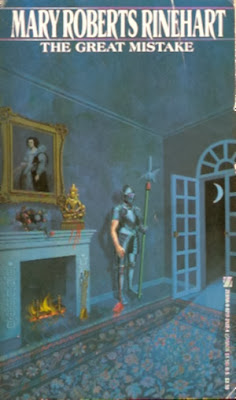
Patricia Abbott is the social secretary to Mrs. Maud Wrainwright, the mistress of a huge mansion called the Cloisters because a good portion of it is a medieval monastery, shipped stone-by-stone from Europe to the idyllic hill overlooking the small town of Beverly. Pat likes her employer and her job, but a pall is cast over the Cloisters when a series of attacks and murders take place in the estate's ominously-named Playhouse. Will Pat and her friends from Beverly be able to discover who the murderer is, or will an innocent person go to jail?
As long-time readers of this blog know, I'm a fan of Mary Roberts Rinehart, the so-called American Agatha Christie (I somewhat disagree with that statement, but if it inspires other people to read her books, I'm good with it). The Great Mistake reminded me of another book of Rinehart's, The Swimming Pool—not just because the covers look similar, but because three quarters of the people who are attacked in this novel wind up either in or next to a swimming pool. I'm going to guess "the great mistake" was installing a pool. Never put in a pool! That way murder lies.
The Great Mistake also deals with similar themes to The Swimming Pool: wealth, the precariousness of the American dream, and so on. It's less successful than The Swimming Pool at fleshing those themes out, but I do think The Great Mistake is much better than The Swimming Pool at telling a good story with sympathetic characters.
The beginning of The Great Mistake immediately sucked me in. I loved Pat and how she definitely had people she liked and people she didn't. I also loved the chemistry between her and Tony Wrainwright, Maud's son. He's definitely charming, whereas Pat isn't, and it takes her a while to warm up to him. And then his wife shows up. Dun-dun-dun!
The mystery was also very complicated and difficult to figure out. For most of the novel I thought this was a good thing. But after the attack on Maud, I felt like it was time things started wrapping up. They didn't; there was a good 100 pages to go and people STILL kept being attacked. It was annoying because these attacks didn't further the plot of the book at all, nor did they provide me clues as to who the murderer was. Keeping readers in the dark is all well and good, but at some point one does need a collection of viable suspects. Even after the detective explained how he figured out who the killer was, Rinehart STILL kept the name of the murderer from us. I was like, "JUST TELL ME WHO THE FUCKING MURDERER IS ALREADY!" Seriously, I said that aloud, while banging the book against my forehead. I was THAT annoyed. If this novel had had a neck I would have strangled it.
The Great Mistake also employs a strange narrative device where Pat describes scenes to the reader as if she witnessed them personally, when she didn't (it's written in the first person, from Pat's point of view). I didn't hate the device, but it was a little odd, and it stretched the story out by a good third or maybe even a half. I don't need to sit in on every freaking conversation the police have, you feel me? If Rinehart wanted to include scenes that didn't involve Pat, why write The Great Mistake in the first person? It was just odd.
Because of the ending, my feelings toward The Great Mistake are mixed. I loved the first half and all the drama between Tony, his wife, Pat, and the other drama going on in Beverly. But by the second half neither Tony nor Maud do very much except panic because another person's dead in the Playhouse, which made them pretty boring; and the final quarter tried my patience to the nth degree (not that that's very difficult to do). There was a point where Rinehart just really needed to stop and wrap things up, and she went way beyond that point. That being said, Pat was a great character, and for the most part it was good mystery. Overall I think The Great Mistake was an okay read, but it's a bummer how a terrible ending can completely alter one's opinion of a novel.
Discus this post with me on Twitter, FaceBook, Google+ or in the comments below.
